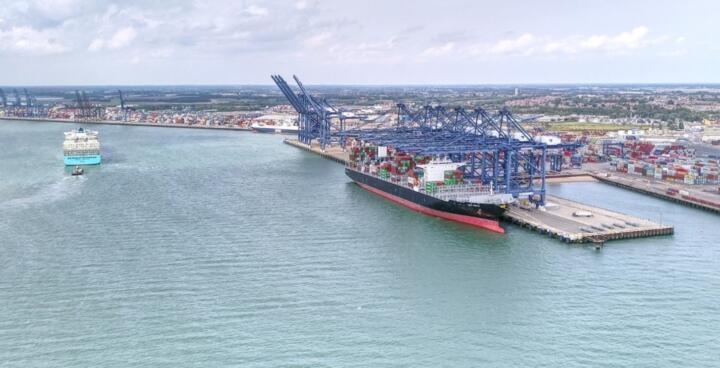AP Møller-Maersk has declared a rerouting strategy for vessels navigating the Red Sea, opting for a detour around Africa via the Cape of Good Hope due to mounting threats from Yemeni rebels. This decision, announced by the world’s second-largest container shipping fleet on Tuesday, is a response to the “highly escalated security situation” in the region, particularly the Bab-el-Mandeb strait.
The company took a precautionary measure last Friday by temporarily halting all vessels scheduled to pass through the strait, citing alarming attacks on commercial vessels and emphasizing the need to ensure the safety and security of seafarers, crews, vessels, and customer cargo on board. The security concerns stem from intensified actions by Iran-backed Houthi rebels targeting ships in the Red Sea, notably those connected to Israel.
This move by Maersk aligns with similar decisions made by other major shipping entities. German company Hapag-Lloyd rerouted all its ships via the Cape of Good Hope on Monday, MSC adjusted some of its services on Friday, and Marseille-based CMA CGM joined the initiative, expressing deep concern about the attacks on commercial vessels in the Red Sea region.

CMA CGM has already rerouted some vessels traveling to and from the US, North Europe, Asia, or the Indian subcontinent to take the longer route around the southern tip of Africa. Other vessels have been instructed to reach safe areas and temporarily suspend their journeys until further notice. Wallenius Wilhelmsen, another shipping company, announced similar measures on Tuesday, endorsing the collective effort to divert vessels around Africa.
This rerouting strategy is anticipated to extend voyage durations by one to two weeks, introducing potential disruptions to global supply chains heavily reliant on the Red Sea and the Suez Canal. The Suez Canal, a vital waterway accounting for 30% of all container ship traffic, plays a crucial role in facilitating the movement of goods, including significant crude oil shipments.
Michael Aldwell, the executive vice-president of Swiss logistics group Kuehne+Nagel, highlighted the impact on global shipping, noting that approximately 19,000 ships traverse the Suez Canal annually, with journeys typically taking 30 to 40 days for an Asia-Europe voyage. Choosing the alternative route from Asia to Europe via the Cape of Good Hope may extend the journey by three to four weeks, absorbing 20% of the global fleet capacity and potentially leading to delays in the availability of shipping resources.
As of Monday, Maersk reported about 20 vessels paused, with half waiting east of the Gulf of Aden and the remaining vessels positioned south or north of the Suez Canal. BP became the first major oil company to suspend all shipments through the area on Monday, underscoring the gravity of the security concerns.
Recognizing the severity of the situation, the United States, led by Defense Secretary Lloyd Austin, announced the formation of an expanded international task force aimed at protecting ships passing through the Red Sea. The task force includes participation from the UK, Bahrain, Canada, France, Italy, Netherlands, Norway, Seychelles, and Spain, and will conduct joint patrols in the southern Red Sea and the Gulf of Aden.
Aldwell emphasized that the extended time spent on the water due to rerouting is expected to absorb 20% of the global fleet capacity, potentially leading to delays in the availability of shipping resources. This underscores the international nature of the challenge, prompting collective action to address the security threats in the region.
In a broader context, AP Møller-Maersk’s decision to reroute vessels comes amid challenges in the container shipping industry. The company recently announced plans to cut at least 10,000 jobs as the industry faces weaker demand during the economic downturn. The global cost of living crisis has prompted Maersk to intensify cost-cutting measures, with CEO Vincent Clerc warning that shipping costs will remain under pressure for the next two years. The ripple effects of the downturn in consumer spending have reversed the fortunes of container shipping companies, which thrived during the Covid-19 lockdowns but now navigate a more challenging landscape.
Support InfoStride News' Credible Journalism: Only credible journalism can guarantee a fair, accountable and transparent society, including democracy and government. It involves a lot of efforts and money. We need your support. Click here to Donate
